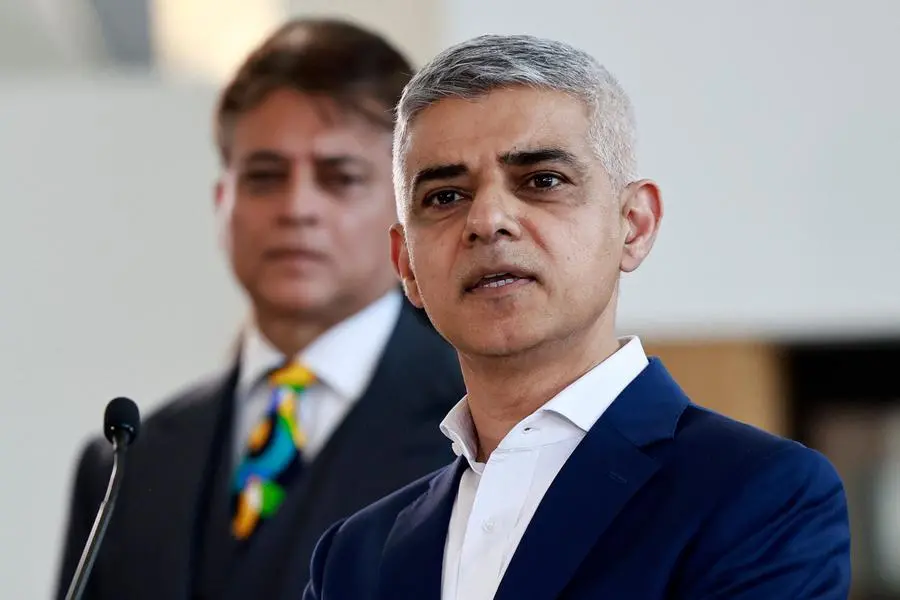PHOTO
London's Labour mayor Sadiq Khan on Saturday secured a record third term, as the party swept a host of mayoral races and local elections to deplete the ruling Conservatives just months before an expected general election.
Khan, 53, beat Tory challenger Susan Hall by 11 points to scupper largely forlorn Tory hopes that they could prise the UK capital away from Labour for the first time since 2016.
The first Muslim mayor of a Western capital when first elected then, he had been widely expected to win as the opposition party surges nationally and the Tories struggle to revive their fortunes.
Hours later in the West Midlands, Conservative mayor Andy Street -- bidding for his own third term -- unexpectedly lost to Labour's Richard Parker, dealing a hammer blow to Prime Minister Rishi Sunak.
That narrow loss left the beleaguered leader with only one notable success in Thursday's votes across England, after Tory mayor Ben Houchen won in Tees Valley, northeast England -- albeit with a vastly reduced majority.
In a truly dismal set of results, Sunak's party finished a humiliating third in local council tallies after losing nearly 500 seats.
"People across the country have had enough of Conservative chaos and decline and voted for change with Labour," its leader Keir Starmer said shortly after confirmation of Parker's victory.
He called the result "phenomenal" and "beyond our expectations".
Writing earlier in Saturday's Daily Telegraph, Sunak had conceded "voters are frustrated" but tried to argue Labour was "not winning in places they admit they need for a majority".
"We Conservatives have everything to fight for," Sunak insisted.
- 'Spirit and values' -
Labour, out of power since 2010 and trounced by Boris Johnson's Conservatives at the last general election in 2019, also emphatically snatched a parliamentary seat from the Tories.
Starmer has seized on winning the Blackpool South constituency and other successes to demand a general election.
Sunak must order a national vote be held by January 28 next year at the latest, and has said he is planning on a poll in the second half of 2024.
Labour has enjoyed double-digit poll leads for all of Sunak's 18 months in charge, as previous Tory scandals, a cost-of-living crisis and various other issues dent the ruling party's standing.
On Thursday, they were defending nearly 1,000 council seats, many secured in 2021 when they led nationwide polls before the implosion of Johnson's premiership and his successor Liz Truss's disastrous 49-day tenure.
With almost all those results in by late Saturday, they had lost close to half and finished third behind the smaller centrist opposition Liberal Democrats.
Meanwhile Labour swept crunch mayoral races across England, from Yorkshire, Manchester and Liverpool in the north to contests across the Midlands.
In London, Khan netted 44 percent of the vote and saw his margin of victory increase compared to the last contest in 2021.
"It's truly an honour to be re-elected for a third term," he told supporters, accusing his Tory opponent of "fearmongering".
"We ran a campaign that was in keeping with the spirit and values of this great city, a city that regards our diversity not as a weakness, but as an almighty strength -- and one that rejects right hard-wing populism," he added.
- 'Impetus' -
If replicated in a nationwide contest, the council tallies suggested Labour would win 34 percent of the vote, with the Tories trailing by nine points, according to the BBC.
Sky News' projection for a general election using the results predicted Labour will be the largest party but short of an overall majority.
Its by-election scalp in Blackpool -- on a mammoth 26-percent swing -- was the Conservatives' 11th such loss in this parliament, the most by any government since the late 1960s.
Speculation has been rife in Westminster that restive Tory lawmakers could use dire local election results to try to replace him.
Despite the returns being at the worst end of estimates, that prospect has not so far materialised.
However, it was not all good news for Labour.
The party lost control of one local authority, and suffered some councillor losses to independents elsewhere, due to what analysts said was its stance on the Israel-Hamas war.
Polling expert John Curtice assessed there were concerning signs for the opposition.
"These were more elections in which the impetus to defeat the Conservatives was greater than the level of enthusiasm for Labour," he noted in the i newspaper.
"Electorally, it is still far from clear that Sir Keir Starmer is the heir to (Tony) Blair."





















